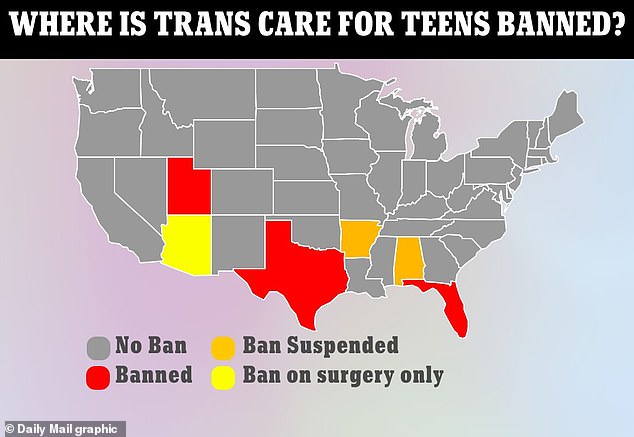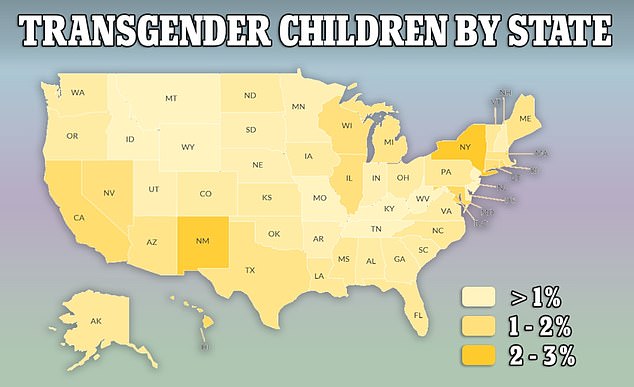Home of Utah GOP state senator is VANDALIZED with spray paint
A Utah Republican lawmaker’s home was vandalized after he sponsored a bill to halt gender reassignment surgery and hormone therapy for transgender minors — as LGBTQ rights groups call for left-wing extremists to step down.
Senator Mike Kennedy’s Alpine garage doors and driveway were plastered with red paint that read, “Fash… This trans.. bash back.”
Kennedy was part of the controversial Senate Bill 16 that, starting in January, banned young people from seeking “gender-affirming care.”
The lawmaker on Friday condemned the vigilantes behind the act as he drew support from LGBTQ+ groups.
Utah Senator Mike Kennedy’s home was vandalized by an upset LGBTQ supporter months after he sponsored a ‘gender affirming care’ bill

Kennedy was part of controversial Senate Bill 16 that banned young people from seeking ‘gender-affirming care’ starting in January
“To those who use violence, vandalism and intimidation to keep me from standing up for what is right, let me be clear: you will not succeed. I am not deterred by your cowardly actions,” Kennedy wrote on Facebook.
“The recent vandalism at my family’s home was not just an attack on me, but on the principles our state stands for.
“We will not let fear and violence determine our fate. As residents of Utah, we will always stand up and strike back against radicals trying to push their agenda in our state.
“I am more determined than ever to work with the good people of Utah to make our state a better place for everyone, especially our children, and I will not back down.”
An LGBTQ+ group, Equality Utah, supported Kennedy, claiming that “extremist” actions do not help fight for what the group believes in.
As LGBTI Americans, we know what it’s like to be a victim of violence. We know what it’s like to fear for our own safety,” the group wrote in a statement.
“It is never acceptable to replicate the violent or threatening tactics we have endured and target those we disagree with.
“These heinous acts are not helping LGBTQ Utahns. They do not promote a climate of equality. In fact, they hurt our efforts to build bridges and create a deeper understanding with our fellow Utahns.”
The statement added that it was not known who committed these acts. But as the group called out Republican extremists, they felt the need to call out the extremists who aligned themselves with their beliefs.
“We are now calling out and condemning extremists who may identify with our side, who use tactics to intimidate and frighten political opponents.”
“The culture wars are now escalating into real-world violence, and we all have a duty to take a stand and condemn extremism wherever it manifests itself — be it vandalism or political violence.”

In January, Utah joined other such states in banning care for transgender minors, including Alabama, Arizona, Arkansas, Florida and Texas

This map shows the percentage of children between the ages of 13 and 17 identified as transgender by state. The dark colors indicate a larger proportion of young people. In New York and New Mexico it is even three percent

This map shows the proportion of the population that identifies as transgender by state. Those with the darkest color have nearly one percent of their population in this category
Senate Bill 16, which went into effect in January, banned gender reassignment surgeries outright for anyone under the age of 18.
The bill also prevented children from starting hormone therapy — including puberty blockers — without a formal diagnosis of gender dysphoria.
An estimated 2,100 Utah teens between the ages of 13 and 17 identify as trans, according to one report from the University of California, Los Angeles (UCLA).
They make up 0.83 percent of the states’ teens, giving Utah the ninth lowest percentage of trans teens of any U.S. state.
The same UCLA report found that the number of Americans identifying as trans nearly doubled between 2017 and 2020, with 300,000 now identifying as such.
About 1.5 percent of American teens identify as trans, the highest of any age group.
Other states with similar bans to Utah include Alabama, Arkansas, Arizona, Florida, and Texas.
